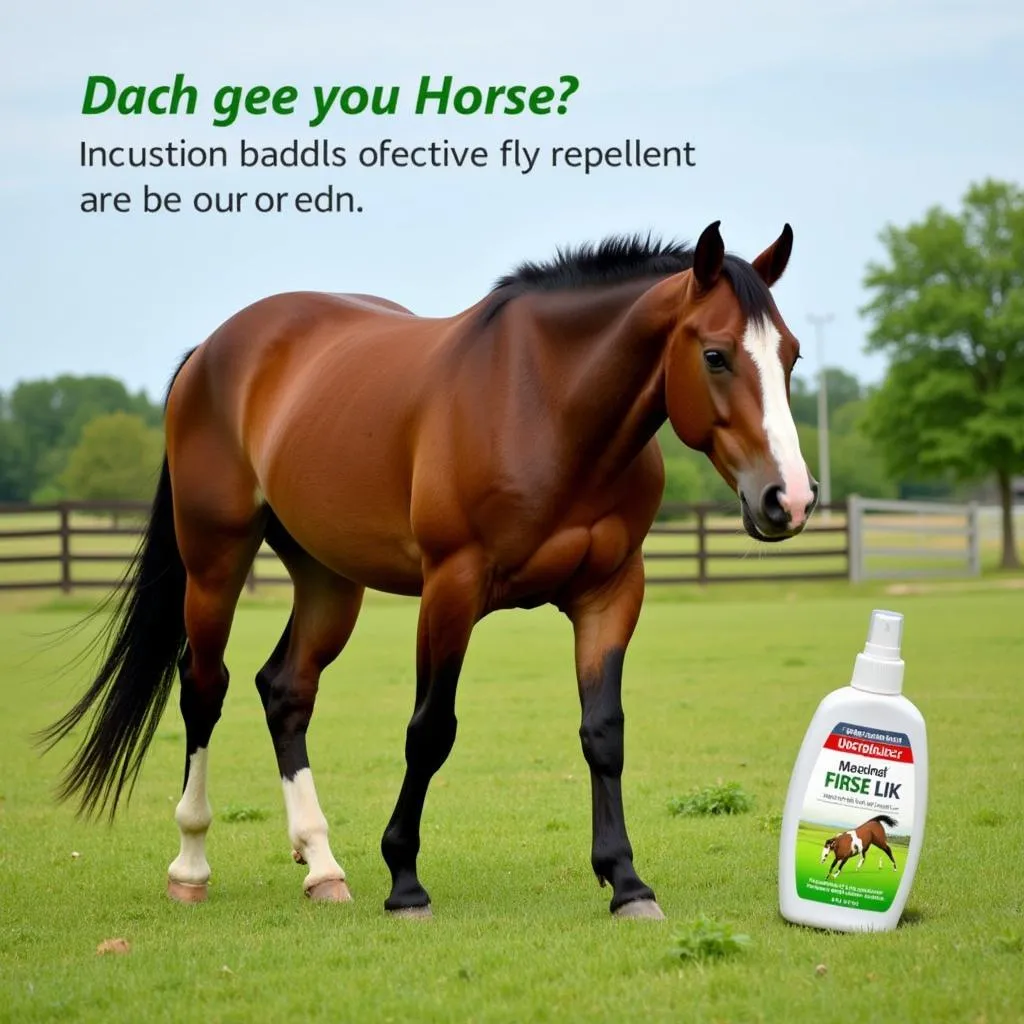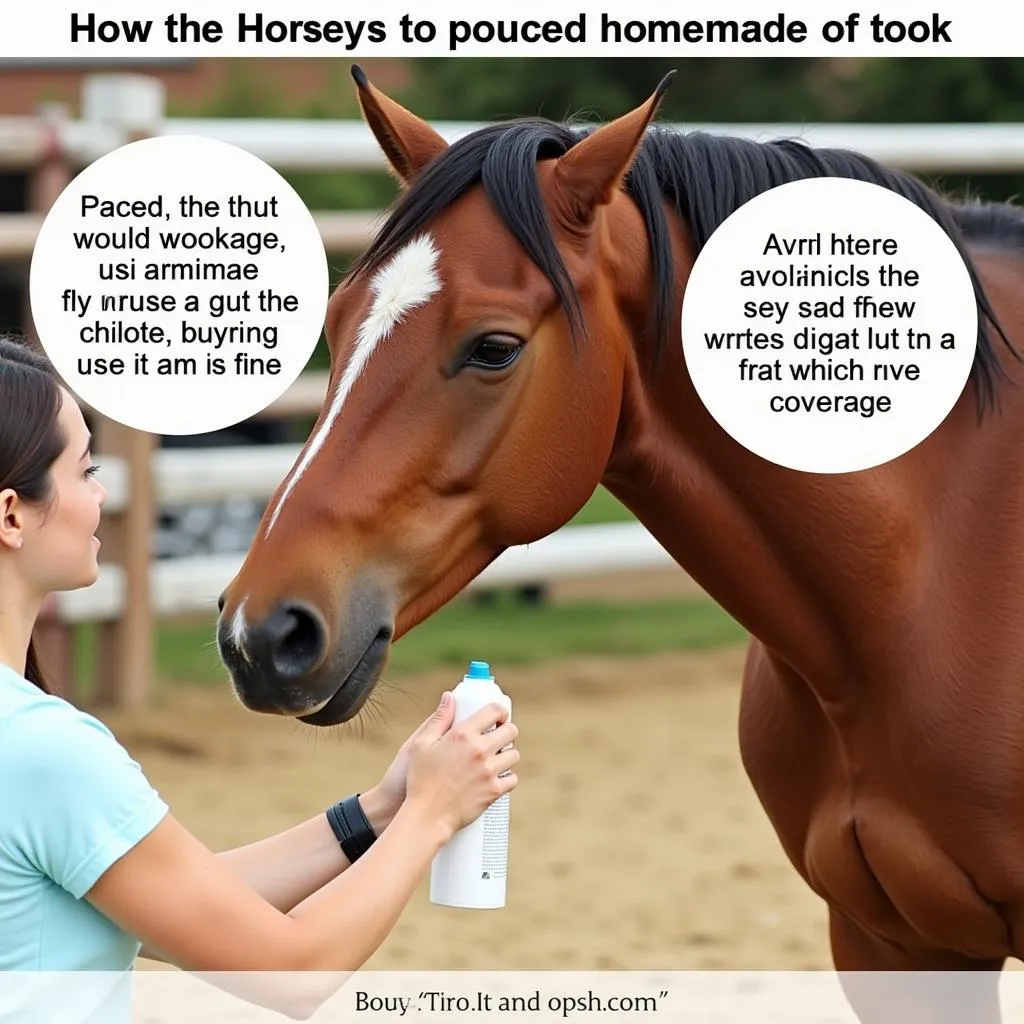Dealing with pesky flies is a common challenge for horse owners, especially during the warmer months. These buzzing insects can cause discomfort, stress, and even transmit diseases. Protecting your equine companion from these nuisances is crucial for their well-being and peace of mind. While commercial fly sprays are readily available, many horse owners seek natural alternatives or prefer to customize their fly repellent solutions. This is where an effective Horse Fly Spray Recipe comes in handy.
Understanding the Nuisance of Flies
Before delving into the specifics of a horse fly spray recipe, it’s essential to understand why flies are so attracted to horses. Flies are drawn to various factors, including:
- Sweat: Horse sweat contains proteins and minerals that flies find appealing.
- Body Heat: Horses emit body heat, creating a warm environment that flies are attracted to.
- Carbon Dioxide: Horses exhale carbon dioxide, which flies use to locate their hosts.
- Manure: Fly populations thrive in areas with manure, making stables and pastures prime breeding grounds.
 Horse bothered by flies in a pasture
Horse bothered by flies in a pasture
Key Ingredients for an Effective Horse Fly Spray Recipe
An effective horse fly spray recipe typically combines ingredients that deter flies through scent, taste, or a combination of both. Here are some key ingredients often used:
- Apple Cider Vinegar: The strong smell of apple cider vinegar disrupts a fly’s sense of smell, making it harder for them to locate the horse.
- Essential Oils: Certain essential oils like citronella, lavender, tea tree, eucalyptus, and peppermint are known for their insect-repelling properties.
- Water: Water acts as a base for diluting the stronger ingredients and facilitating even application.
- Other Natural Additives: Some horse owners also incorporate ingredients like witch hazel (astringent properties), garlic (natural repellent), and dish soap (helps the mixture adhere to the horse’s coat).
Crafting Your Own Horse Fly Spray Recipe
Here’s a simple and effective horse fly spray recipe that you can easily make at home:
Ingredients:
- 1 cup apple cider vinegar
- 1 cup water
- 20 drops citronella essential oil
- 10 drops lavender essential oil
- 10 drops tea tree essential oil
Instructions:
- Combine all ingredients in a clean spray bottle.
- Shake well to ensure thorough mixing.
- Spray liberally on your horse’s coat, avoiding the eyes and mucous membranes.
Tips:
- Always perform a patch test on a small area of your horse’s coat before applying any new spray.
- Store your homemade fly spray in a cool, dark place.
- Reapply the spray as needed, especially during peak fly activity.
 Applying homemade fly spray on a horse
Applying homemade fly spray on a horse
Choosing the Right Fly Spray for Your Horse
While a homemade horse fly spray recipe can be effective, several factors might influence your choice of fly repellent. These include:
- Sensitivity: Some horses may be sensitive to certain essential oils or ingredients.
- Severity of Fly Infestation: In areas with high fly pressure, a stronger commercial fly spray might be necessary.
- Convenience: Commercial fly sprays offer convenience, especially for horse owners short on time.
Expert Insight:
“Every horse is different, and what works for one may not work for another,” says Dr. Emily Carter, a veterinarian specializing in equine health. “Always observe your horse’s reaction to any new fly spray and consult your veterinarian if you have any concerns.”
Conclusion
Protecting your horse from flies is essential for their well-being and comfort. A well-crafted horse fly spray recipe, using natural ingredients like apple cider vinegar and essential oils, can provide an effective solution for repelling these pesky insects. Remember to consider your horse’s individual needs and consult your veterinarian for any specific recommendations. By taking proactive measures, you can help your equine companion enjoy a fly-free and comfortable summer.
FAQs
-
How often should I apply fly spray to my horse?
The frequency of application depends on the fly spray used and the level of fly pressure. Generally, applying fly spray every 12-24 hours is recommended. -
Can I use human insect repellent on my horse?
No, human insect repellents contain ingredients that can be toxic to horses. -
Are there any natural fly control methods for my stable and pasture?
Yes, using fly predators, maintaining good hygiene, and providing adequate ventilation can help control fly populations. -
What are the signs of a fly allergy in horses?
Signs of a fly allergy include excessive itching, hives, and hair loss. -
Can I make a large batch of horse fly spray and store it?
Yes, you can make larger batches and store them in a cool, dark place for several weeks.
For all your horse care needs and expert advice, contact Justus Horses USA at 0772127271 or [email protected]. You can also visit our facility located at QGM2+WX2, Vị Trung, Vị Thuỷ, Hậu Giang, Việt Nam. Our dedicated team is available 24/7 to assist you.